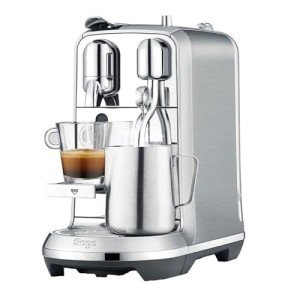Home Use Espresso Machines: A Comprehensive Guide
Espresso machines have actually ended up being a staple in lots of households as coffee lovers look for to duplicate café-quality brews in the convenience of their kitchen areas. The increase in appeal has actually led to a diverse market filled with different designs, functions, and rates. This short article intends to provide an informative introduction of home use espresso machines, helping readers navigate their choices successfully.
Understanding Espresso Machines
Espresso machines work by forcing hot water through finely-ground coffee under high pressure, resulting in a focused coffee drink referred to as espresso. There are numerous types of espresso machines classified based upon their developing methods and level of automation. The most typical types consist of:
- Manual Espresso Machines: These require the user to manage the pressure and water circulation, permitting a more hands-on coffee-making experience.
- Semi-Automatic Espresso Machines: These offer automatic control over water pressure, while the user by hand grinds and tamps the coffee.
- Automatic Espresso Machines: With the push of a button, these machines instantly control the flow of water, making it easier to brew espresso with consistent outcomes.
- Super- Automatic Espresso Machines : These all-in-one machines deal with grinding, tampering, brewing, and even milk frothing, making them ideal for users trying to find benefit.
- Capsule or Pod Machines: These use pre-packaged coffee pods to develop espresso with very little effort, but they restrict choice in developing methods and flavors.
Table: Comparison of Espresso Machine Types
| Type | Control Level | Alleviate of Use | Cleaning Level | Ideal For |
|---|---|---|---|---|
| Manual | User-controlled | Moderate | High | Coffee purists |
| Semi-Automatic | Partial automation | Moderate | Moderate | Home baristas |
| Automatic | Fully automated | Easy | Low | Busy people |
| Super-Automatic | Totally automated | Really simple | Extremely low | Convenience hunters |
| Capsule/Pod | Fully automated | Very simple | Extremely low | Casual drinkers |
Key Features to Consider
When picking a home use espresso machine, it's important to think about numerous functions that can substantially affect the quality of espresso and user experience.
- Pressure: Look for machines that supply a minimum of 9 bars of pressure, as this is considered ideal for developing espresso.
- Boiler Systems: Single vs. dual boiler systems figure out temperature stability and the ability to brew espresso and steam milk at the same time.
- Grinder: Integrated mills allow for freshly ground coffee, which boosts flavor. Think about machines with adjustable grind settings.
- Milk Frother: For those who take pleasure in coffees and lattes, an integrated steam wand or automatic frother is vital.
- Size and Design: Consider your kitchen space and aesthetic preferences. Machines are available in numerous sizes, from compact to large setups.
- Rate: Home espresso machines can vary from a few hundred to several thousand dollars, so it's essential to establish a budget before exploring options.
Pros and Cons of Home Use Espresso Machines
| Pros | Cons |
|---|---|
| Benefit of developing coffee in your home | Initial investment can be high |
| Quality of espresso is typically superior | Needs some ability, specifically with manual machines |
| Capability to try out tastes | Upkeep and cleaning can be labor-intensive |
| Can conserve money in the long run | Not all machines will match every coffee preference |
Maintenance and Cleaning Tips
Preserving an espresso machine is important for lengthening its life and making sure consistent brew quality. Here are some useful ideas:
- Regular Descaling: Minerals from water can construct up in the machine. Descale every 1-3 months, depending upon water solidity.
- Daily Cleaning: Rinse portafilters, baskets, and steam wands after each use to avoid coffee oils from developing residue.
- Use Filtered Water: This can help in reducing mineral buildup and enhance the taste of coffee.
- Change Gaskets and Seals: These parts might use out with time and must be replaced to maintain pressure and performance.
- Check out the Manual: Each machine has specific care guidelines; following these will ensure longevity.
Frequently Asked Questions About Home Use Espresso Machines
Q1: What is the very best budget espresso machine? Pod Espresso Machines depends on private requirements, but designs like the DeLonghi EC155 or the Breville Bambino are popular among users for offering excellent worth. Q2: How long do home espresso machines typically last?With proper upkeep, home espresso machines can last anywhere from 5 to 15 years, depending on the quality of the machine and frequency of use. Q3: Can I make coffees and lattes with any espresso machine?While most espresso machines can make cappuccinos and lattes, having a trusted
steam wand or frother is important for achieving the ideal milk texture.
Q4: Are super-automatic machines worth the investment?For those who focus on benefit and fast developing, super-automatic machines can be worth the financial investment, though they might lack some customizability in brew strength and flavor. Q5: What kinds of coffee beans are best for espresso?While personal choice plays a role, beans identified as" espresso "blends are usually roasted darker, developing abundant tastes and a creamy texture when brewed.
Investing in a home espresso machine can change the day-to-day coffee routine into something unique, raising home brews to café quality. By understanding the different kinds of machines, essential features to consider, maintenance needs, and weighing the
benefits and drawbacks, customers can make informed decisions that match their individual preferences. As the espresso culture continues to grow, no matter the option, every brew can be a tasty experience waiting to be savored.

